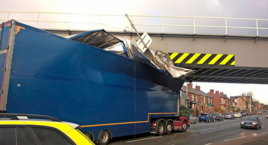Somewhere in the UK, a road lorry or bus bashes into a railway bridge every five hours, leaving Network Rail to pick up a £5.5 million bill for delays and cancellations in the last year alone. One structure was hit 19 times.
The never-ending problem of drivers ignoring clear warning signs, despite having high-tech in-cab mapping technology, is highlighted in yet another NR campaign launched this month.
It comes in anticipation of a spike in incidents over Black Friday and the Christmas period, alongside an influx of newly qualified and inexperienced lorry drivers on Britain’s roads to meet an estimated 100,000 shortfall.
The bridge strike total for 2020-21 fell to 1,624 from the previous year’s 1,720.
However, this figure is not necessarily considered an improvement because of reduced road traffic during the pandemic… and the cost to NR was still high.
Coddenham Road bridge in Needham Market, which carries the key Felixstowe-West Midlands heavy freight route over the B1078 road, carries the dubious honour of being Britain’s most bashed bridge in 2020-21, with 19 strikes. Not far behind were St John’s Street bridge in Lichfield City (18) and Harlaxton Road bridge in Grantham (16).
The Rail Safety and Standards Board (RSSB) has been on the case for around a decade. It cites errors in route planning, driver ignorance and lack of supervision as areas needing constant attention. It has also highlighted poor signage at low bridges.
To read the full story, see RAIL 945















Login to comment
Comments
David Hunt - 23/11/2021 12:48
If every bridge bash was claimed in full Frome the culprit or their employer,I feel sure there would be a huge decrease in bridge bashing.Until then the situation will never improve very much.
Steve, Swansea - 23/11/2021 16:54
Why is it that mulit storey car parks often have a boom overhead before the entrance to prevent damage, yet this doesn't happen with railways? A simple solution to he problem?